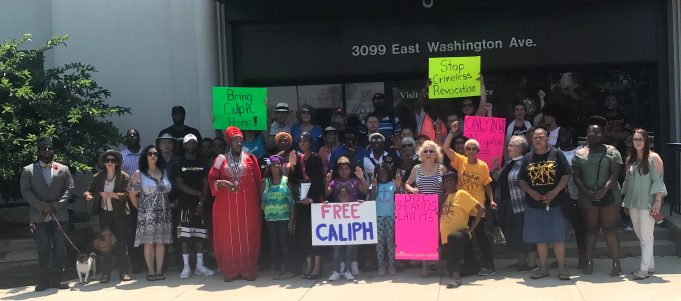Members of various Madison-area faith and civic communities – led by EXPO (EX-incarcerated People Organizing), along with MOSES, WISDOM, the ACLU and the Gamaliel Network – gathered in front of the Wisconsin Department of Corrections on Madison’s east side July 3 to call for justice for a community leader, Minister Caliph Muab-El, and for an end to crimeless revocation.
“We saw a lot of testimony from kids on how Caliph has positively impacted their lives. They don’t understand why he’s being locked up … for no reason,” says EXPO Lead Organizer Jerome Dillard. “He has been a great community leader. He has made an impact. And now he’s gone.”
On top of youth speakers who came out in support for Muab-El, the event also featured words from Ana Garcia-Ashley, executive director of the Gamaliel National Network; Rev. Christa Fisher, former chaplain of Madison Area Jail Ministries; Sister Jenesia McNair Bey, president of the Sisters Auxiliary and assistant chairperson of the Moorish Science Temple of America and Sina Davis, co-founder of Mothers in the Neighborhood
Muab-El has been imprisoned by the state of Wisconsin since Feb. 7, Dillard says, after he was detained because of a single, third-party accusation.
“He’s been there for 6 months now. This was based on an allegation made against him by his -ex,” Dillard tells Madison365. “Madison Police did an investigation and sent everything to the D.A. who found them to be baseless. They found the allegations weren’t true.”
The Department of Corrections (DOC) declined the request to release Mr. Muab’El from custody at this time, stating in a letter to Muab’El’s attorney that they believed he engaged in the alleged behaviors. Dillard, who has spent a lifetime helping former prisoners reintegrate into society, is very upset.
“The DOC locks people up who have not been convicted of a new crime. Even if they are not one of the 3,000 people sent back to prison for a crimeless revocation, people lose their jobs, lose their apartments, miss their car payments because of baseless ‘holds’ like this,” he says. “The DOC acts this way because no one holds them accountable. This has to stop.”
There has not even been a hearing regarding Caliph’s imprisonment, Dillard says. A hearing, scheduled for May 1, was not completed because of Department of Corrections logistical issues. In the meantime, because he is being held on a “revocation hold,” Muab-El has no right to bail.

“Caliph has lost two jobs because of this incarceration,” Dillard says. “It’s all very sad.”
Dillard says he personally knows hundreds of people who have lost a job or housing because of something as simple as a traffic ticket.
“I was working with this one young man who I personally got up to take him to work for a week … got up at 5 a.m. and drove from Fitchburg to Sun Prairie and back into Madison because there’s no busline to get him to work and keep a job of $18/hour,” Dillard says. “This 20-year-old got a ticket and they threw him in jail because he did not report police contact. He sees his [parole] agent once a month and he forgot about the ticket … he really did.”
Dillard called like crazy to get the young man out of jail by Monday so he wouldn’t lose his good-paying job.
“They released him the next Wednesday and he lost the job,” Dillard says. “It was a very nice job – $18 an hour. It crushed the young man.”

Dillard says that he’s concerned about his friend Muab-El, executive director of Breaking Barriers Mentoring which empowers youth facing societal barriers by nurturing diverse mentoring relationships and community support. Muab-El is also co-founder of the Focused Interruption Coalition which is focused on responding to and reducing gun violence.
“It’s wearing on him right now. He’s like, ‘I don’t understand how they can do this.’ How can they just lock him up?” Dillard asks. “Corrections are saying, ‘Due to his violent history.’ This was something that happened when he was 15 years old. He’s 36 now.”
It could be another 30 days after the revocation hearing that Muab-El will be released.
“This isn’t just about Caliph,” says Dillard. “This is happening to thousands of people in Wisconsin an across the country. But our state is really lacking in how we deal with people in community corrections.”




























